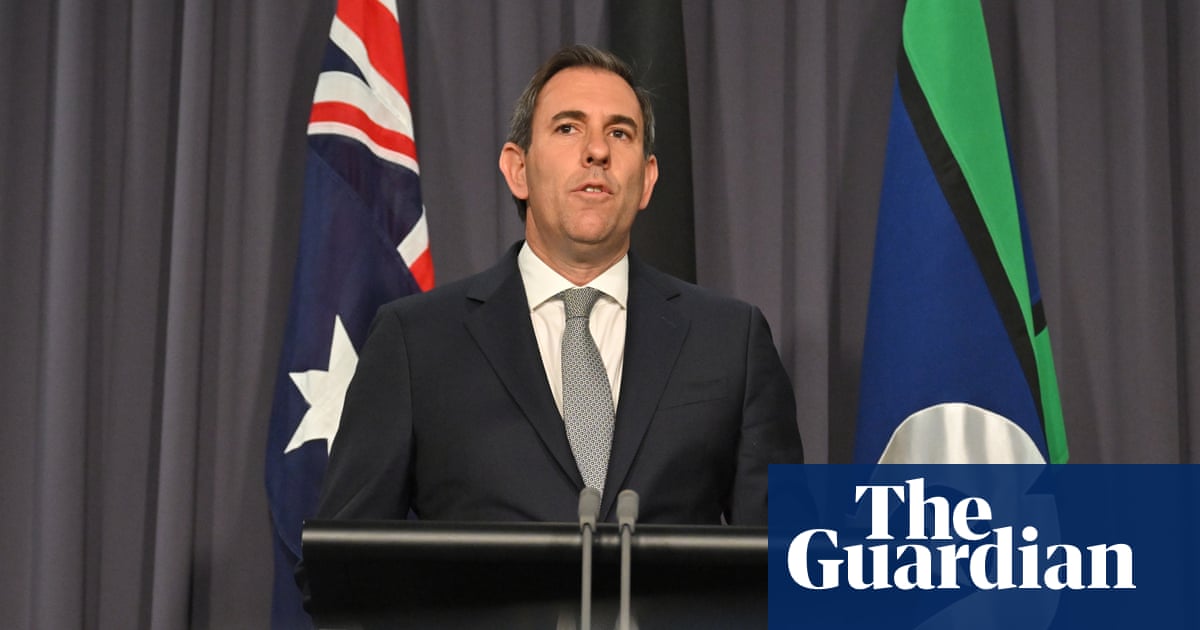The Albanese government has backed down on its contentious superannuation tax plan, dumping the proposal to target unrealised gains after sustained criticism from sections of the media, industry and politics.
The treasurer, Jim Chalmers, announced the surprise change on Monday in a move that won praise from one of its most high-profile critics – the former Labor prime minister Paul Keating.
The government will proceed with a doubling of the concessional tax rate on superannuation balances between $3m and $10m, from 15% to 30%.
But cabinet has agreed to dramatically overhaul other elements of a policy first announced in 2023, including indexing the thresholds and delaying the start date by a year until 1 July 2026.
Sign up: AU Breaking News email
The government will also increase the low-income superannuation tax offset by $310 to $810 and raise the eligibility threshold from $37,000 to $45,000 from 1 July 2027.
The most significant change is the decision to scrap the contentious proposal to tax so-called “unrealised gains” – the change in the value of an asset, such as a farm or investment property, that has yet to be sold.
That element of the policy has faced sustained criticism, especially from self-managed super fund operators, which claimed some people with big holdings in illiquid assets could be forced to sell up in order to raise the cash to cover the change in the notional value of their balances.
Chalmers rebuffed suggestions that the original proposal was a mistake, arguing the government was responding to “genuine feedback”.
“It was the advice that we were acting on, that that was the best way to go about it at the time,” he told reporters in Canberra.
“We asked for the best, most-workable alternative to that, and that’s what we’re announcing today.”
In a statement, Keating – the architect of Australia’s superannuation system and a critic of Chalmers’ original proposal – described the revised plan as a “huge policy achievement”.
“It is reform of a kind that shares substance with necessity. Necessity that every government since 2007 has conveniently overlooked or simply regarded as too difficult,” he said.
The government failed to pass the superannuation tax plan in the last parliament and was yet to resurrect it after its thumping election win in May, fuelling speculation it was weighing up changes.
Treasury officials last week confirmed the department had conducted fresh modelling on the impact of the changes and that the prime minister’s office had become directly involved, further heightening expectations of a potential overhaul.
On Friday, Albanese insisted there were “no changes” to the policy, echoing the type of language he used before revising the stage-three tax cuts in early 2024.
As part of the changes announced on Monday, the government will apply a new, higher 40% tax rate on earnings for balances larger than $10m.
The $3m and $10m thresholds will be indexed to inflation, addressing a key criticism of the original proposal that more people would be captured as super balances increased over time.
Chalmers said the revised plan would still only affect fewer than 0.5% of savers – or roughly 80,000 accounts.
Asked how long he had been working on the changes, the treasurer said: “Some time”.
“We’ve taken our time to work through the issues. We didn’t react quickly to every editorial or every criticism from every quarter,” he said.
The original proposal was expected to raise $2.7bn in its first full year.
The revised plan will instead raise $1.6bn in its first year in 2028-29, which includes the $435m cost of the low-income superannuation tax offset over the forward estimates.
The Albanese government needs the support of either the Coalition or the Greens to get the legislation through the Senate.
The shadow treasurer, Ted O’Brien, said the opposition would consider the details of the new proposal before agreeing a position.
“The treasurer has been chewed up and his tax plan has now been chucked out,” O’Brien said. “That is a win for everyday Australians.”
The Greens economics spokesperson, Nick McKim – whose party has previously pushed for the super balance threshold to be lowered from $3m to $2m – welcomed the extra help for low-income earners.
People who earn between $28,000 and $45,000 could retire with an extra $15,000 in their savings, according to Treasury estimates.
But McKim said the other changes represented a “capitulation to the wealthiest people in the country and a slap in the face to everyone else who pays their tax straight out of their pay packet”.
“Labor has stripped out the tax on unrealised gains and indexed the $3m threshold, a gift to the super-rich that will cost the budget billions.”
The Tasmanian senator also appeared to criticise the decision to index the threshold despite previously advocating for it.
“This new model will give a green light to the richest 0.5% to keep hoarding investment properties,” he said. “No capital gains tax will have to be paid as long as they don’t sell their properties and, even then, less than half of the profits will attract tax.”
Chalmers said he had a “constructive” conversation with the Greens leader, Larissa Waters, on Monday morning, ahead of the announcement.

